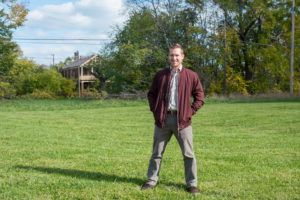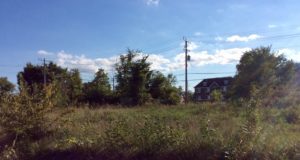Long before smokestacks from Detroit’s factories became part of the city’s landscape, it was lush with plants and trees.
The city was so fertile the French, who settled on the city’s east side and developed ribbon farms, didn’t have to do much to cultivate the land.
Now many of the factories have shuttered their doors and the empty buildings have been excavated. The land is returning to people willing to farm it and the focus is returning to trees – apple trees.

Apple trees are growing all over Detroit. They zigzag along vacant fields and small plots of land in many neighborhoods from east to west. In southwest Detroit, for example, fruit orchards are part of the landscape in Romanowski Park.
In 2012, the activist group People for Palmer Park planted 820 apple trees in two orchards on the neighborhood’s western edge, raising concerns about rodents and other pests and sparking a battle among neighbors. The trees survived the controversy.
It’s not the only apple orchard sprouting up on Detroit’s east side.
The seeds for the Farnsworth Street Orchard started in 2014 when owners Ron Shelton and Laura Burmann, neighborhood residents, conceived the orchard and planted apple trees. Shelton, a master craftsman with years of mechanical experience, began building a cider mill, and Burmann studied forestry. Now the orchard at Farnsworth Street and Moran is home to a variety of heritage apples, including the Detroit Red, as well as the onsite cider mill.

To help the pair further develop the orchard and cider mill, the Detroit Gatsby Lawn Party hosted the Detroit Gatsby Bootlegger Dinner at the site. Proceeds from the $130 ticket fundraiser benefitted the orchard.
On the east side, Wolverine Human Services has an ambitious plan to develop 11 acres of land into Core Orchards Detroit, the city’s first U-Pick-It apple orchard that will be home to 3,500 trees.
Located in an area challenged by poverty and crime, the organization provides housing, food and social services for young men through its programs. In 2010, more than 200 young people were being served in the after-school and summer programs, and up to 200 people were eating in the soup kitchen each day. By 2013, the neighborhood became so desolate Wolverine had to shut down its youth program. However, it recently started serving food to the community three times a week.
After analyzing the neighborhood, Wolverine discovered 90 percent of the land is vacant, says Matthew Wollack, the organization’s senior director of development and marketing and the second generation of his family leading the organization. Wolverine decided to work to return the land to its once vibrant, thriving state and to do it with apples as a resource.

“We already have been taking care of a portion of the land for 20 years, and we decided we wanted to remove the blight on the two blocks we’re proposing,” says Wollack. “The orchards can offer so many opportunities to give back to the community, with the U-Pick-It model and raised, wheelchair-accessible beds for the community to grow their own crops to sell or to eat.”
So far, the family-run nonprofit has raised $405,000 for the development, which is located in the middle of an area bounded by Jefferson and Mack Avenues, Alter Road and Conner Street.
More than 16 apple varieties are grown in Michigan, including Fuji, Honeycrisp, Jonagold and Gala. Most are grown on small, family farms, making the fruit important to the state’s economy.
Wolverine also is exploring how it can expand its programs to enhance the area. The apple orchard is only a small part of its future big picture.
Over time, the group hopes to raise up to $1.5 million to develop the vacant Carstens Elementary School into a new community center with basketball and tennis courts, swimming pool, music and arts programs, a community grocery and a farmers market.
It also plans to have 88 raised beds so people can grow their own crops at no charge and hopes to provide other produce for sale that the community can purchase with SNAP benefits.
The group still has its work cut out for it, says Greg Hoffman, Wolverine’s director of community relations.
Some community members initially heard about the project through the media instead of directly from Wolverine, which caused concern for some people, he says.
“We already have been taking care of a portion of the land for 20 years, and we decided we wanted to remove the blight on the two blocks we’re proposing.” – Matthew Wollack, senior director of development and marketing, Wolverine Human Services
Once Wolverine leaders are able to sit down with more people, he’s hopeful they’ll have support from everyone involved. They’re planning to have a town hall meeting hosted by the Riverbend Neighborhood Association and also will have support from Fresh Era Detroit, a board of young professional development council that has been meeting at Wolverine about two years.
“We are our own entity, and we are partnering and working with anyone who has open arms and is in agriculture,” Wollack says. “We’re open to any relationship, and we’re developing as such.”

Wolverine is working on community engagement with the Detroit Land Bank, the Greening of Detroit, Michigan Department of Agriculture, the Michigan Economic Development Corp., block clubs, neighborhood organizations and residents who live near the orchards. Once that work is complete, plans for the project will be presented to the Detroit City Council for approval.
The hope is by next spring three-year-old trees will be planted on two city blocks near the corner of Lenox and Charlevoix next to the Wolverine Center and the John S. Vitale Center. Half will be Honeycrisp apple trees, which must grow another two to three years before they yield their first crops. Typically, a pound of Honeycrisp apples sell for about $2.50, according to the U.S. Department of Agriculture.

“We have a lot of people who are getting excited about the project, but you will have to be patient,” says Isaiah Wunsch, chief agricultural officer with Core Orchards Detroit, whose family grows apples and more than 80 percent of the state’s cherries in Traverse City. “There’s a small crop the second year and a really abundant crop in the third year. The trees can last for hundreds of years if they are well-maintained, but fruit farming is a long game.”
These orchards are part of one of Michigan’s biggest businesses. According to the Michigan Economic Development Corp., the state produces more than 900 million pounds of apples each year, making apples one of Michigan’s largest and most valuable fruit crops. More than 16 varieties are grown in the state, including Fuji, Honeycrisp, Jonagold and Gala. Most are grown on small, family farms.
“It’s a huge part of our economy, and cider mills and donuts are a staple,” says Wolverine Human Services’ Wollack. “Why not grow some in Detroit? Why should Detroit be different than the rest of the state? Through our neighborhood market, school and produce, it’s a great business model to bring to the area.”
With all this growth, it is certainly fertile ground for more neighborhood farms in our city.
Photos by Paul Engstrom


